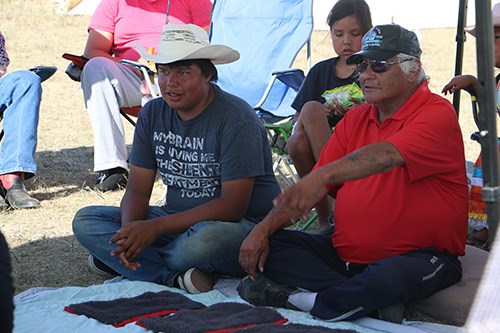┬Ā ┬Ā ┬Ā ┬Ā ┬Ā ┬Ā ┬Ā ┬Ā ┬Ā ŌĆ£The limits of my language means the limits of my world,ŌĆØ Ludwig Wittgenstein ŌĆō an Austrian-British Philosopher ŌĆō is credited with saying.
┬Ā┬Ā┬Ā┬Ā┬Ā┬Ā┬Ā┬Ā┬Ā┬Ā┬Ā┬Ā┬Ā┬Ā┬Ā┬Ā┬Ā For First Nations people across Canada the revitalization of their language means the rediscovery of their world ŌĆō their culture. Being able to share knowledge of language is extremely important as their customs, prayers, and ceremonies are all intricately woven together by language. For many people their language had been lost through a generational gap caused by residential schools and the attempted assimilation of First Nations into Western customs.
┬Ā┬Ā┬Ā┬Ā┬Ā┬Ā┬Ā┬Ā┬Ā┬Ā┬Ā┬Ā┬Ā┬Ā┬Ā┬Ā┬Ā For the Pheasant Rump Nakota First Nation their language has slowly been reclaimed and revitalized as those who are fluent or nearly fluent teach and learn amongst the younger generations in order to spread the knowledge of their language. This included a four-day language and culture camp from Monday, Aug. 21, to Thursday, Aug. 24, held on Pheasant Rump, which saw approximately 100 people come and take in any learning they could as their schedules allowed.
┬Ā┬Ā┬Ā┬Ā┬Ā┬Ā┬Ā┬Ā┬Ā┬Ā┬Ā┬Ā┬Ā┬Ā┬Ā┬Ā┬Ā Armand McArthur of the Pheasant Rump Nakota First Nation stated, ŌĆ£ItŌĆÖs important to revitalize the language. Today, there are less than 100 fluent speakers of Nakota, and bringing it back is a struggle, but we must struggle forward with it.ŌĆØ
┬Ā┬Ā┬Ā┬Ā┬Ā┬Ā┬Ā┬Ā┬Ā┬Ā┬Ā┬Ā┬Ā┬Ā┬Ā┬Ā┬Ā ŌĆ£We are also bringing back the sign language our people use, which has been really successful for our children and adults to pick up. Sign language was a universal way to communicate, it might have changed slightly from tribe to tribe, but it was always recognizable.ŌĆØ
┬Ā┬Ā┬Ā┬Ā┬Ā┬Ā┬Ā┬Ā┬Ā┬Ā┬Ā┬Ā┬Ā┬Ā┬Ā┬Ā┬Ā This camp followed a youth camp for children in July and past language immersion camps held by McArthur and Peter Bigstone of Ocean Man First Nation.
┬Ā┬Ā┬Ā┬Ā┬Ā┬Ā┬Ā┬Ā┬Ā┬Ā┬Ā┬Ā┬Ā┬Ā┬Ā┬Ā┬Ā When learning the language, it can be difficult to move between English speaking explanations to Nakota translations as it may not always come out exactly.
┬Ā┬Ā┬Ā┬Ā┬Ā┬Ā┬Ā┬Ā┬Ā┬Ā┬Ā┬Ā┬Ā┬Ā┬Ā┬Ā┬Ā ŌĆ£Often we are using descriptive meanings for translations like sugar,ŌĆØ McArthur said. Taking a piece of paper he phonetically wrote out the phrase, ŌĆ£cha shmo ya bi.ŌĆØ Translated this phrase means, ŌĆ£the tree is dripping,ŌĆØ referring to maple syrup and since they do not have a specific word for sugar, this is the phrase used to describe sweet things.
┬Ā┬Ā┬Ā┬Ā┬Ā┬Ā┬Ā┬Ā┬Ā┬Ā┬Ā┬Ā┬Ā┬Ā┬Ā┬Ā┬Ā Chief of Pheasant Rump First Nation, Ira McArthur, explained the importance of revitalizing the language and bringing identity to youth through language: ŌĆ£ItŌĆÖs been a really good few daysŌĆ” WeŌĆÖre very pleased with the turnout and the participation of the youth. There were a few boys that the elders took under their wing and have surpassed expectations in language and Indian sign language.ŌĆØ
┬Ā┬Ā┬Ā┬Ā┬Ā┬Ā┬Ā┬Ā┬Ā┬Ā┬Ā┬Ā┬Ā┬Ā┬Ā┬Ā┬Ā ŌĆ£[Language] is very important to our community here. In 1901, they took our reserve away and we were moved to White Bear where other languages were spoken, so for 89-years we lost our own language. We were a minority there and kind of discouraged from using our language. WeŌĆÖve been actively pursuing its preservation since we were given our reserve back in 1990. WeŌĆÖre really taking the opportunity to share ceremonies and encourage young people to participate in cultural events and ceremonies.ŌĆØ
┬Ā┬Ā┬Ā┬Ā┬Ā┬Ā┬Ā┬Ā┬Ā┬Ā┬Ā┬Ā┬Ā┬Ā┬Ā┬Ā┬Ā ŌĆ£Elder Armand McArthur has gone out of his way, on his own, to share the language, teachings, and ceremonies with others. HeŌĆÖs been a blessing to our community. I think our efforts have made a difference in our community as well. I feel there are less social problems here and more young people living healthy lives. I credit the elders for encouraging and motivating young people here to learn.ŌĆØ
┬Ā┬Ā┬Ā┬Ā┬Ā┬Ā┬Ā┬Ā┬Ā┬Ā┬Ā┬Ā┬Ā┬Ā┬Ā┬Ā┬Ā Freda Owatch of Carry the Kettle Nakota First Nation added, ŌĆ£I used to be fluent, and I still have it, but after living out and speaking more English, you forget things. The elders who spoke it fluently everyday are now gone, so we have to bring it back and work together to do so. ItŌĆÖs my identity, our identity. Without language we wouldnŌĆÖt have our culture because our language is all of our teachings; itŌĆÖs our foundation.ŌĆØ
┬Ā┬Ā┬Ā┬Ā┬Ā┬Ā┬Ā┬Ā┬Ā┬Ā┬Ā┬Ā┬Ā┬Ā┬Ā┬Ā┬Ā ŌĆ£I was brought here as a female speaker. ThereŌĆÖs a difference in the language when men speak and when women speakŌĆ”ŌĆØ Thus, it is important to hear the subtle differences in gendered speech when learning about the language.
┬Ā┬Ā┬Ā┬Ā┬Ā┬Ā┬Ā┬Ā┬Ā┬Ā┬Ā┬Ā┬Ā┬Ā┬Ā┬Ā┬Ā ŌĆ£We need to try and draw the interest of our young people. They donŌĆÖt know their identity. They follow rap music or something else, but if we can teach them their language they wonŌĆÖt have to search for an identity.ŌĆØ
┬Ā┬Ā┬Ā┬Ā┬Ā┬Ā┬Ā┬Ā┬Ā┬Ā┬Ā┬Ā┬Ā┬Ā┬Ā┬Ā┬Ā Paraphrasing, Owatch continued, ŌĆ£In 1983 the Prime Minister, Trudeau, he said something like, if you no longer speak your language and no longer practice your culture then you are assimilated.ŌĆØ
┬Ā┬Ā┬Ā┬Ā┬Ā┬Ā┬Ā┬Ā┬Ā┬Ā┬Ā┬Ā┬Ā┬Ā┬Ā┬Ā┬Ā ŌĆ£Our people call these little reservations ŌĆśhome,ŌĆÖ but without language we have no identity and we wonŌĆÖt have a land base. Our ancestors suffered and died for what we do have. What legacy do you want to leave for your children, grandchildren, or your grandchildrenŌĆÖs children? I personally donŌĆÖt want them saying that their elders didnŌĆÖt fight hard enough for them; so, we need to retain our language. We have to revive it. We have to keep it.ŌĆØ
┬Ā┬Ā┬Ā┬Ā┬Ā┬Ā┬Ā┬Ā┬Ā┬Ā┬Ā┬Ā┬Ā┬Ā┬Ā┬Ā┬Ā In addition to the knowledge shared throughout the four-days Armand McArthur was honoured as the last fluent speaker in the Pheasant Rump Nakota First Nation community. Something he is actively working to change.
┬Ā┬Ā┬Ā┬Ā┬Ā┬Ā┬Ā┬Ā┬Ā┬Ā┬Ā┬Ā┬Ā┬Ā┬Ā┬Ā┬Ā ŌĆ£This weekŌĆÖs events were largely planned by the EldersŌĆÖ Committee,ŌĆØ Chief McArthur staid. ŌĆ£TheyŌĆÖve really taken the lead on planning these events and carried out in a way for children and youth to be accommodated and learn as well.ŌĆØ




